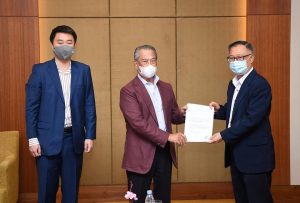[ad_1]

Malaysian Prime Minister Muhyiddin Yassin meets with two defecting MPs from the People’s Justice Party, February 28, 2021.
Credit: Facebook/Muhyiddin Yassin
Malaysian Prime Minister Muhyiddin Yassin has promised to lift a controversial state of emergency and hold elections as soon as the COVID-19 pandemic eases up, he said today. In a speech marking the first anniversary of his appointment as prime minister, the leader claimed that his embattled administration has successfully fended off “the double whammy of health and economic crises.”
“This is the first time in our history that an emergency has a deadline,” Muhyiddin said in the nationally televised address. “Once the pandemic is over, which I hope will be very soon, I will advise the Yang di-Pertuan Agong to dissolve the parliament. Until such time, my colleagues in the Cabinet and I will continue to carry out our duties and responsibilities to the best of our ability.”
Muhyiddin’s speech is an apparent attempt to downplay critics’ claims that the Malaysian leader has used the COVID-19 pandemic as cover to stifle political challenges to his unelected rule.
In mid-January, Malaysia’s King Al-Sultan Abdullah declared a state of emergency in order to curb the spread of COVID-19, postponing any elections until at least August and, Muhyiddin’s government has argued, delayed any sitting of parliament on public health grounds. However, the king announced last week that the emergency does not preclude the convening of parliament, something that Muhyiddin pointedly did not mention in his speech – and perhaps unsurprisingly. While the state of emergency has allowed Malaysia to get a handle on COVID-19, it has also conveniently granted Muhyiddin the space to consolidate his hold on power after a turbulent 2020.
Muhyiddin has yet to face an electoral test, elevated to power a year ago today after helping precipitate the collapse of the multiethnic Pakatan Harapan (PH) coalition, which had scored an unexpected election victory in May 2018.
Many of the details of the tortured machinations that preceded Muhyiddin’s appointment remain contested. But it is clear what began as as a disagreement within the PH camp over a plan to hand power from the nonagenarian Mahathir to his rival-cum-ally Anwar Ibrahim ended Muhyiddin’s appointment at the head of a hastily-assembled Perikatan Nasional (PN) coalition.
In the year since, the political instability has only worsened. Enjoying only a translucently thin majority, Muhyiddin and PN have been in survival mode, facing challenges on a number of fronts.
In September, Malaysia’s perennial opposition figure Anwar Ibrahim claimed that he commanded a “strong, formidable and convincing majority” in parliament, which would enable him to replace Muhyiddin’s government. While Anwar’s challenge did not succeed, the Malaysian leader was also forced to fend off unrest within his own political camp, in particular from the United Malays National Organisation (UMNO), the country’s dominant ethnic Malay party, which threatened to withdraw its support from the government in October.
The announcement of a state of emergency on January 11 came after three UMNO MPs withdrew their support for Muhyiddin’s leadership at the beginning of the year, leaving the government with just 109 out of 220 MPs and depriving it of the majority needed to pass legislation without opposition support. (The parliament has 222 seats, but two are currently vacant.) The state of emergency, which expires on August 1, has allowed Muhyiddin to stabilize his position and fend off the challenge from UMNO, while preparing for elections to follow at some point after the end of the emergency.
Yesterday, Muhyiddin’s majority was restored when two MPs from opposition leader Anwar Ibrahim’s People’s Justice Party declared their support for PN. But given the fragility of the PN coalition, a parliamentary session before the emergency expires on August 1 is widely viewed as unlikely. The next step, presumably, would be a general election. Given the machinations of the past year, however, it is uncertain that even that will mark a definitive end to the country’s political crisis.
[ad_2]
Source link